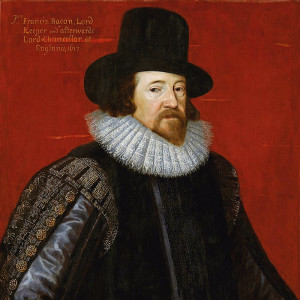Episodes

Monday Feb 28, 2022
Ep 137 - Francis Bacon and the New Organon
Monday Feb 28, 2022
Monday Feb 28, 2022
As the emcee noted at a concert here in Lander, a Musical History Tour, the Renaissance--the period when Europe revived its intellectual life by re-evaluating the writings of the Hellenistic past--ends around the year 1600, give or take. By that time, the focus had shifted toward going beyond the ancients instead of merely revisiting their achievements. This shift in focus happened on a different schedule in different fields, to be certain. Music may have been well ahead of the ancients already in the high medieval period. The Scholastics, and indeed their Arabian predecessors, while firmly rooted in Aristotle and the Neoplatonists, were already progressing beyond those foundations in the thirteenth century. On the other hand, painting and sculpture may not have outstripped the Greeks and Romans until the nineteenth century.
In any case, the seventeenth century would be the one in which Greek mathematics and Aristotelian natural philosophy gave way precipitously to new approaches. Algebra, lurking in the background of Greek thought and poking its head above the canopy in Arabian and Italian mathematics, would finally spawn analytic geometry and calculus. The focus and methods of natural philosophy would shift in many ways, including the use of mathematics and a great increase in the number of people collecting observations and conducting experiments and discussing their results with others. The existing sciences of astronomy, mechanics, botany, and zoology would be transformed, and chemistry and geology would be born outright. Inventions like the telescope and microscope would begin to reveal unsuspected layers of richness in the universe.
-Bacon: bio and politics
-The Reformation had to attack Scholastic *theology* but the universities continued to be heavily Aristotelian
-Aristotle and the distinction between philosophy and science that would be inverted by the 19th century
-Aristotle's focus on deduction and Bacon's polemical critique of the syllogism: "The New Organon"
-The role of induction and statistical reasoning; Bacon's blind spot for mathematics and his tables
Image: Francis Bacon by Paul van Somer, courtesy Wikimedia (By Paul van Somer I - pl.pinterest.com, Public Domain, https://commons.wikimedia.org/w/index.php?curid=19958108)


Comments (0)
To leave or reply to comments, please download free Podbean or
No Comments
To leave or reply to comments,
please download free Podbean App.